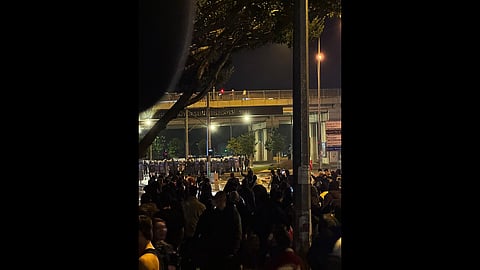
- Home
- NG Hindi
- India
- World
- Politics
- Sex & Relationships
- Entertainment
- Culture
- Lifestyle
- Economy
- Sports
- Sp. Coverage
- Misc.
- NewsGram Exclusive
- Jobs / Internships

By Arzu Geybullayeva
Turkey’s main opposition party, the Republican People’s Party (CHP), is facing an escalating political crisis. On September 2, a ruling of the 45th Civil Court of First Instance annulled the CHP's Istanbul Provincial Congress, held in October 2023. As a result, Özgür Çelik, the party's current provincial chair — along with 196 delegates — was dismissed. In their place, a team of trustees, reportedly aligned with the former party leadership, was appointed.
The CHP's leadership has dismissed the ruling as null and void, even as it faces another court hearing, scheduled for September 15, which revolves around a “mutlak butlan” (absolute nullity) case aiming to annul the party's 38th Ordinary Congress, held in November 2023. This congress led to election of Özgür Özel as the new party leader, ousting long-time chairman Kemal Kılıçdaroğlu.
The September 2 court ruling stated there were procedural violations during the vote. A similar argument was made for absolute nullity case, as a lawsuit initiated by a party member reportedly aligned with Kılıçdaroğlu alleged procedural violations and potential “vote buying” during the party congress.
Despite Özel's legal team maintaining the case should be dismissed on the basis of invalidity due to the lawsuit's expired filing period, and because political party conventions fall under electoral board jurisdiction rather than civil courts, the hearing is scheduled to proceed. Should the court conclude that violations did indeed happen, such a ruling would nullify all decisions taken by the party's current leadership since the congress.
In response, some 900 party delegates called for an extraordinary congress against the possibility of a similar court ruling. Özel said if the court were to deliver a ruling that affects the party's leadership and a trustee is appointed to replace him, “that trustee would last no more than six days.” The party's extraordinary congress is scheduled to take place on September 24.
Others have been questioning whether such an outcome would be possible. According to journalist Barış Terkoğlu, assuming Kılıçdaroğlu secures his seat as party leader following the court decision on September 15, his first move would be to cancel the upcoming congress.
Academic Berk Esen, however, disagreed. Writing on X, Essen opined that he does not think Kılıçdaroğlu “will act as harshly,” given that he “is a passive politician” who will try to prolong the process by delaying holding the congress. “This way,” Esen explained, “he will attempt to undermine the Özel-İmamoğlu team. Instead of expulsion, he will prefer the path of resignation and pushing toward a separate party.”
On the heels of the September 2 court decision, the crisis reached a new peak when police escorted court-appointed trustee Gürsel Tekin into the CHP’s Istanbul provincial headquarters on September 8, amid widespread protests and internet restrictions that throttled access to YouTube, X, Instagram and WhatsApp.a
The night before, police surrounded and barricaded party headquarters to prevent any demonstrations by supporters. The Istanbul Governor’s Office, meanwhile, announced a ban on rallies, press statements, marches, setting up tents, opening stands, sit-ins, signature campaigns, and commemorative events in the districts of Beşiktaş, Beyoğlu, Eyüpsultan, Kağıthane, Sarıyer, and Şişli between September 7 and 10.
Journalist Gonca Tokyol summed up the situation on X:
The bans and barricades did not stop people from showing up, but those who did were violently dispersed by riot police on September 8. On September 9, the party's 102nd anniversary, ousted provincial leader Çelik posted on X: “Good morning Istanbul. No blockade or attack can stop the Republican People's Party's march to power.”
In an interview with The Financial Times, Özel said the ruling government was staging “a coup against the future ruling party.” For almost a year now, the ruling Justice and Development Party government has been on the offensive against the main opposition party, culminating with the arrest of popular Istanbul mayor Ekrem İmamoğlu on March 19, 2025 on various charges, including corruption. Both prior to and after the mayor's arrest, multiple CHP members were also detained on similar grounds.
Speaking to the digital news outlet Fayn about the recent court ruling, constitutional law expert and faculty member at Galatasaray University’s Faculty of Law Professor Şule Özsoy Boyunsuz said, “Democratic political life in Turkey, as we know it, has come to an end.” She elaborated:
Others voices soon chimed in. In April, political scientist Şebnem Gümüşçü noted that the government has taken hold over the public sphere through its control over the media, the judiciary, and other key institutions. As such, she argued, “Turkey is at a crossroads: it will either democratize or move toward full authoritarianism, where elections have no meaning.”
A group of academics signed a petition in which they expressed support for the opposition and its leadership. “As academics concerned about the future of this country, we support the CHP and the leadership of Özgür Özel in their struggle for democracy and dignity, and we call on all civil initiatives to strongly expand this struggle,” read the statement.
Responding to the blocking of the party building on September 7, political scientist Kemal Büyükyükse noted on X:
Büyükyükse continued, “The next step is clear, trusteeship for CHP nationally, paving the way for liquidation. This is historic. For 75 years, multiparty politics survived even through coups. Never before has the principal opposition been dismantled while governing major cities and leading polls. What is happening is not simply the erosion of democracy, it is blatant shameless demolition.”
Between now and September 15, all eyes are on the opposition party and its leadership. In the aftermath, all eyes will be on Turkey and the future of its citizens.
(GlobalVoices/NS)
This article is republished from GlobalVoices under a Creative Commons license. Read the original article.
Also Read:
